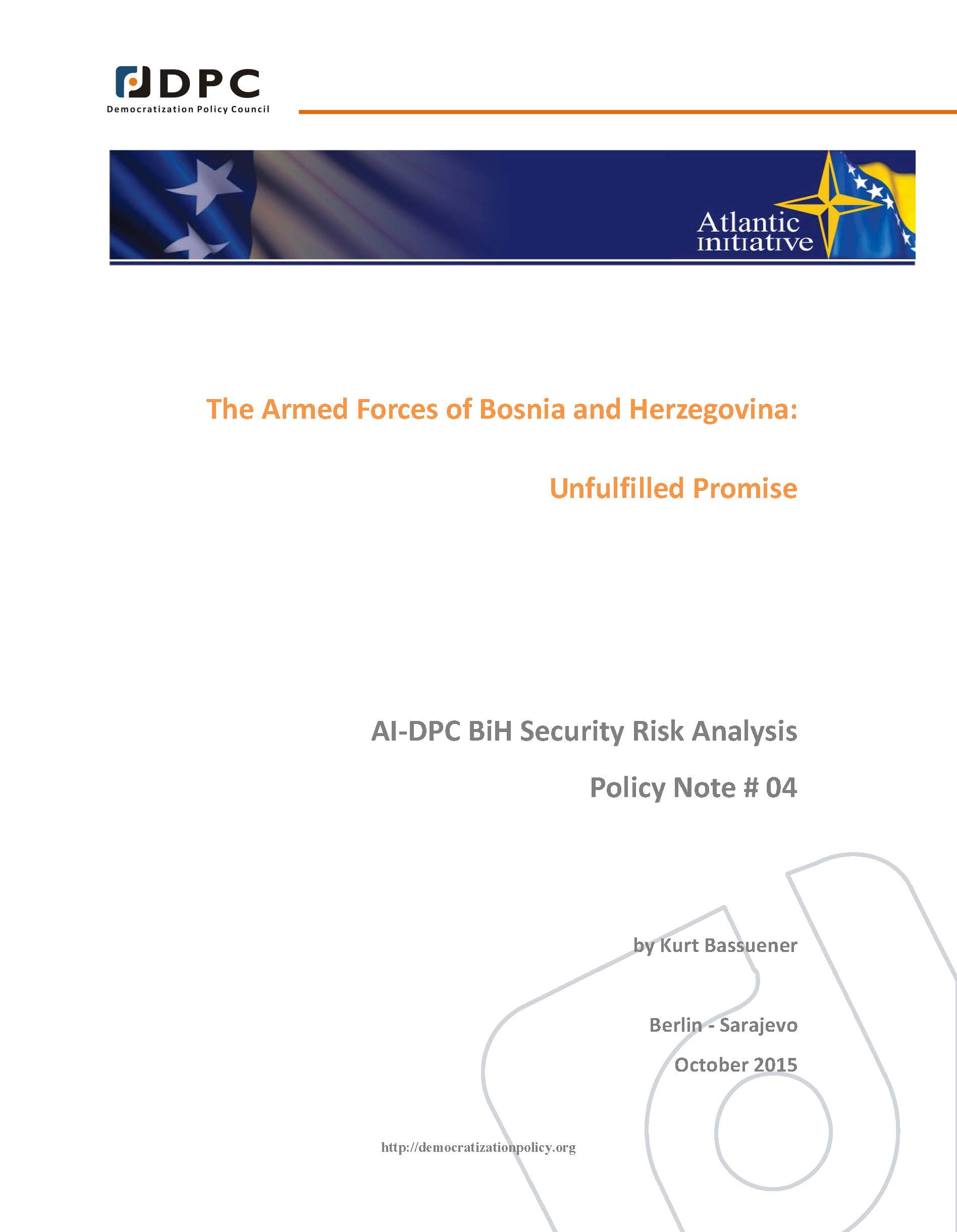AI-DPC BiH SECURITY ANALYSIS POLICY NOTE 04: The Armed Forces of Bosnia and Herzegovina: Unfulfilled Promise
AI-DPC BiH SECURITY ANALYSIS POLICY NOTE 04: The Armed Forces of Bosnia and Herzegovina: Unfulfilled Promise
Author(s): Kurt Bassuener
Contributor(s): Toby Vogel (Editor)
Subject(s): Security and defense, Military policy
Published by: DPC Democratization Policy Council e.V.
Keywords: BiH; armed forces; AFBIH; RS; Mladen Ivanić; government; NATO; political enviroment; regimental system; military capability; 2014; defense property;
Summary/Abstract: The Armed Forces of Bosnia and Herzegovina (AFBiH or “the force”) will mark its tenth anniversary in 2016 and stands as a useful reminder of the considerable progress achieved in the first decade following the 1995 Dayton Peace Accords. However, the force was assembled just when all other state-building consolidation and reforms began to stop, stall or reverse.. The AFBiH is not immune to the effects of the polarized political environment and its attendant afflictions – patronage and clientelism, short-termism, and a lack of accountability. Furthermore, the Republika Srpska (RS) Government has perennially targeted the AFBiH’s budget for cuts as part of its policy to demilitarize BiH, and thereby further weaken the state. In addition, in much the same way that Dayton included compromises which have been proven to obstruct the creation of a functional and accountable governance system for BiH, the tradeoffs required to create the AFBiH impedes its integration. In particular, the maintenance of ethnic majority infantry battalions poses a risk in the event of the emergence of further interethnic polarization, as does the (ceremonial) regimental system – originally intended as a containment mechanism for Armija BiH, Vojske RS, and HVO traditions for veterans of these forces, but now being perpetuated by the encouragement of new recruits to join them. Full integration of the force down to the operational level remains unrealized. Furthermore, sources indicate that currying favor with political and religious authorities in pursuit of advancement has become ever more visible in the ranks. Progress toward the goal of NATO membership, questioned by both the RS Government and more recently by Serb member of the BiH Presidency Mladen Ivanić, has been hobbled by the fact that the ownership of defense property remains in dispute. Resolution of this issue, which would free troops from defending these sites for other duties, is an explicit requirement for the NATO Membership Action Plan (MAP) to be activated. Registration of this property, ruled State property by the BiH Constitutional Court and more recently the Court of BiH, was part of the coalition agreement for the BiH Government, but remains vehemently opposed by the RS. Despite these considerable impediments, the AFBiH has performed admirably, both abroad in peace support operations (with regular contingents supporting ISAF in Afghanistan) and at home. In the latter case, during and following the May 2014 flood emergency, the AFBiH saved lives and property of BiH citizens throughout the flood affected areas. This boosted morale considerably and connected the force to the citizenry as never before. The AFBiH was the only state, entity, or cantonal official body to emerge with its reputation enhanced through its flood response; all others performed miserably. This disaster response experience also identified deficiencies in equipment, training and preparation which can be remediated to ensure better performance in the future. Finally, the AFBiH is inducting “new blood” into the officer corps through a British-sponsored program to recruit university graduates. The effort was universally lauded in the author’s interviews as an avenue to further professionalize the force. In short, the problems identified with the AFBiH are essentially the same as they were four years ago, when the first edition of the DPC/Atlantic Initiative (AI) Security Risk Analysis was published. There is no expectation that the AFBiH will generate destabilization or initiate inter-ethnic violence. But there is almost universal belief that in the event of such violence, it would collapse along its ethnic fault lines. The AFBiH cannot but reflect the politically-driven polarization which dominates the political arena in BiH.
Series: DEM. POLICY COUNCIL - Policy Notes
- Page Count: 22
- Publication Year: 2015
- Language: English
- Content File-PDF

